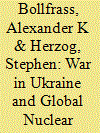| Srl | Item |
| 1 |
ID:
191917


|
|
|
|
|
| Summary/Abstract |
Any act of battlefield violence results from a combination of organizational strategy and a combatant's personal motives. To measure the relative contribution of each, our research design leverages the predictable effect of ambient temperature on human aggression. Using fine-grained data collected by US forces during the Afghanistan and Iraq conflicts, we test whether temperature and violence are linked for attacks that can be initiated by individual combatants, but not for those requiring organizational coordination. To distinguish alternative explanations involving temperature effects on target movements, we examine situations where targets are stationary. We find that when individual combatants have discretion over the initiation of violence, ambient temperature does shape battlefield outcomes. There is no such effect when organizational coordination is necessary. We also find that ambient temperature affects combat-age males’ endorsement of insurgent violence in a survey taken during the conflict in Iraq. Our findings caution against attributing strategic causes to violence and encourage research into how strategic and individual-level motivations interact in conflict.
|
|
|
|
|
|
|
|
|
|
|
|
|
|
|
|
| 2 |
ID:
186364


|
|
|
|
|
| Summary/Abstract |
The global nuclear order had been challenged in recent years by individual proliferators, the moribund US–Russian arms-control process and resultant frustration over stalled progress towards disarmament. Then Russia launched its full-scale invasion of Ukraine under cover of nuclear threats against NATO. This has neither exposed the international nuclear-governance regime as toothless nor brought it to the verge of collapse. The global nuclear order’s history shows its resilience to rogue acts by great powers. It will continue to serve key nuclear-capable states’ security and energy interests in the non-proliferation domain. Arms control between Washington and Moscow has always been sensitive to their strategic whims and can be reconstituted. The main consequence of Russian President Vladimir Putin’s war is renewed public awareness of the often unpalatable role nuclear weapons play in international politics. Nuclear targeting, deterrent threats and associated risk-reduction efforts are hardly new phenomena.
|
|
|
|
|
|
|
|
|
|
|
|
|
|
|
|
| 3 |
ID:
099520


|
|
|
|
|
| Publication |
2010.
|
| Summary/Abstract |
The current nuclear nonproliferation order is no longer sustainable. The Treaty on the Non-Proliferation of Nuclear Weapons (NPT) has weakened considerably over the years, with nuclear have-nots displaying increased dissatisfaction with the status quo. Meanwhile, demands for civilian nuclear technology have led to increased proliferation risks in the form of dual-use technologies. Arms control as we currently understand it-piecemeal treaties and agreements-is no longer sufficient to address the growing threat of proliferation and the frailty of the NPT. This article calls for a bolder nonproliferation agenda pursuing multilateral nuclear disarmament. Disarmament is, in fact, technologically achievable; a lack of political will stands as the only remaining roadblock to a world free of nuclear weapons. A better understanding of the technological feasibility of disarmament, as well as recognition of the diminishing strategic value of nuclear weapons, will help to erode this political reluctance.
|
|
|
|
|
|
|
|
|
|
|
|
|
|
|
|